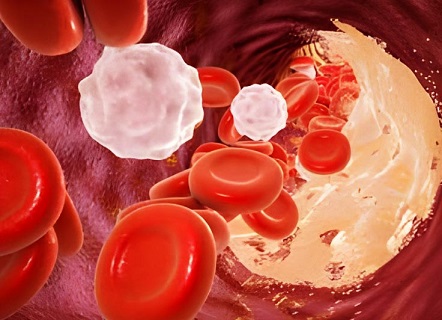Nikhil Prasad Fact checked by:Thailand Medical News Team Aug 16, 2024 1 year, 4 months, 2 weeks, 2 days, 17 hours, 54 minutes ago
Medical News:
The Silent Killer - Atherosclerosis
Atherosclerosis is a condition that may sound unfamiliar, but it plays a critical role in many serious heart-related problems. It's the underlying cause of diseases like coronary heart disease, heart attacks, and strokes. But what exactly is atherosclerosis? In simple terms, it's a condition where your arteries - the blood vessels that carry oxygen and nutrients from your heart to the rest of your body - become clogged with fatty deposits called plaques. Over time, these plaques can harden and narrow the arteries, limiting the flow of oxygen-rich blood to your organs and other parts of your body. But what's particularly interesting is how our immune system, specifically T-cells, is involved in this process.
 T-cells play a role in atherosclerosis
T-cells play a role in atherosclerosis
This
Medical News report covers a study by researchers from Union Hospital, Tongji Medical College, Huazhong University of Science and Technology-China that explores how T-cells, through a process called metabolic reprogramming, contribute to the progression or regression of atherosclerosis.
The Role of T-Cells in Atherosclerosis
T-cells are a type of white blood cell that plays a central role in the immune system. They help protect the body against infections and other diseases. However, in the case of atherosclerosis, T-cells can be a double-edged sword. There are different types of T-cells, such as Th1, Th17, Th2, and Treg cells. Each of these has a distinct role in either promoting or reducing inflammation within the arteries.
-Pro-Inflammatory T-Cells (Th1 and Th17): These cells are like the fire-starters of the immune system. They drive the progression of atherosclerosis by promoting inflammation. Th1 cells release chemicals called cytokines, like interferon-gamma (IFN-γ) and interleukin-2 (IL-2), which worsen plaque buildup in the arteries. Th17 cells also contribute to this inflammatory process by producing other cytokines like IL-17 and IL-6.
-Anti-Inflammatory T-Cells (Th2 and Treg): On the other hand, Th2 and Treg cells act as the firefighters. They help cool down the inflammation and can even reverse the damage. Th2 cells produce cytokines like IL-4, IL-5, and IL-13, which reduce inflammation and may help stabilize the plaques. Treg cells are particularly important because they secrete substances like IL-10 and TGF-β, which not only reduce inflammation but also help repair the damaged areas of the arteries.
Metabolic Reprogramming: The Game Changer
So, how do T-cells decide whether to become pro-inflammatory or anti-inflammatory? This is where metabolic reprogramming comes into play.
Metabolic reprogramming is essentially a shift in how cells generate energy and use nutrients, and it can significantly influence T-cell behavior.
-Glucose Metabolism: In environments with low oxygen or high glucose levels, such as within inflamed plaques, T-cel
ls tend to increase their glucose intake and shift toward glycolysis, a less efficient way of generating energy but one that supports rapid cell division and pro-inflammatory activity. This shift is mainly observed in Th1 and Th17 cells, which become more active and contribute to the worsening of atherosclerosis.
-Lipid Metabolism: On the flip side, in conditions where there’s plenty of oxygen and fat available, T-cells shift towards oxidative phosphorylation and fatty acid oxidation, which are more efficient energy-producing processes. This shift favors the differentiation of Th2 and Treg cells, which help in reducing inflammation and may slow down or even reverse atherosclerosis.
Key Findings in T-Cell Metabolism and Atherosclerosis
Recent studies have revealed several critical insights into how T-cell metabolic reprogramming affects atherosclerosis:
-Pro-Inflammatory Effects of Th1/Th17: The increase in glucose metabolism through glycolysis fuels the pro-inflammatory activities of Th1 and Th17 cells. This contributes to the progression of atherosclerosis by making the plaques in the arteries more unstable and likely to cause blockages.
-Anti-Inflammatory Role of Th2/Treg: Th2 and Treg cells rely on oxidative phosphorylation and fatty acid metabolism. This metabolic pathway not only supports their survival but also enhances their ability to counteract inflammation, thereby stabilizing plaques and potentially reversing atherosclerosis.
-Molecular Pathways Involved: Two critical molecular pathways, mTOR and AMPK, are involved in regulating T-cell metabolism. mTOR is like the accelerator that boosts T-cell activity and glucose metabolism, whereas AMPK acts as the brake, promoting energy conservation and enhancing the anti-inflammatory functions of Treg cells.
Implications for Treatment
Understanding the metabolic reprogramming of T-cells opens new avenues for treating atherosclerosis. By targeting specific metabolic pathways, it may be possible to tip the balance in favor of anti-inflammatory T-cells, thus reducing the progression of atherosclerosis. For example, drugs that inhibit mTOR could potentially reduce the pro-inflammatory activity of Th1 and Th17 cells, while those that activate AMPK might enhance the protective functions of Treg cells.
Conclusion: A New Frontier in Atherosclerosis Treatment
Atherosclerosis is a complex disease, but understanding the role of T-cells and their metabolic reprogramming offers hope for new treatments. By targeting the metabolic pathways that control T-cell behavior, it might be possible to slow down or even reverse the progression of this disease. The findings discussed in this article highlight the importance of continuing research in this area, as it holds the potential to significantly improve the lives of those affected by heart disease.
The study findings were published in the peer-reviewed journal Biomedicines.
https://www.mdpi.com/2227-9059/12/8/1844
For the latest about Atherosclerosis, keep on logging to Thailand
Medical News.
Read Also:
https://www.thailandmedical.news/news/breaking-medical-news-study-discovers-that-memory-cd8-t-cells-causes-atherosclerosis-in-the-aged-by-promoting-plaque-buildup-of-the-arteries
https://www.thailandmedical.news/news/american-study-warns-that-covid-19-is-triggering-the-onset-and-progression-of-atherosclerosis-in-many
https://www.thailandmedical.news/news/geniposide-a-promising-treatment-for-covid-19-and-atherosclerosis-patients
